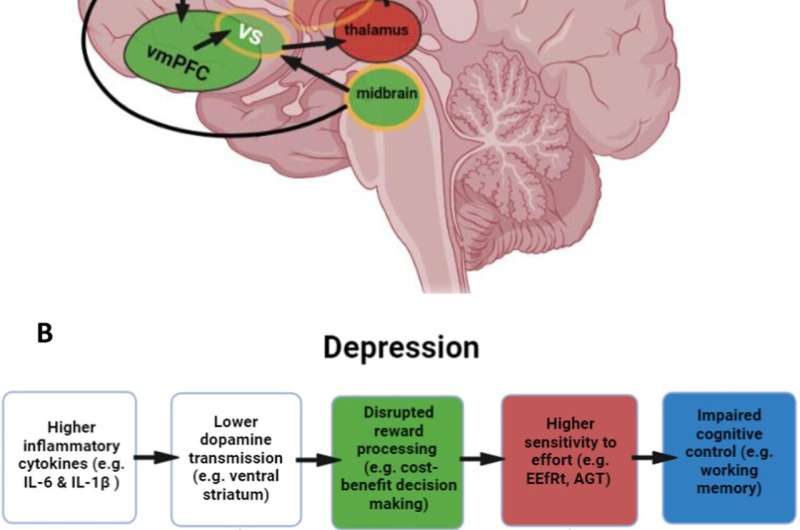This article has been reviewed according to Science X's editorial process and policies. Editors have highlighted the following attributes while ensuring the content's credibility:
fact-checked
peer-reviewed publication
trusted source
proofread
New clues point towards how exercise reduces symptoms of depression

The processes in the brain and body through which physical exercise reduces depressive symptoms have been explored by UCL researchers.
Depression is the leading cause of disability worldwide and is associated with disruptions to several brain and psychological processes, including impaired learning and memory. Physical activity, especially aerobic exercise, has been found to reduce depressive symptoms, but until now the processes behind this have been poorly understood.
In a new review article published in Translational Psychiatry, researchers propose a novel hypothesis to understand the antidepressant effects of exercise. They believe that the process may hinge on motivation, which is very important for alleviating a number of symptoms of depression, such as anhedonia (a lack of interest or joy in life's experiences), low energy and "brain fog."
The team summarized research papers that explored the mechanisms of depression in both humans and animals and concluded that depression, especially anhedonia, is associated with elevated inflammation (caused by the body's immune response). Importantly, inflammation is also linked to disrupted dopamine transmission. These biological changes may represent key processes leading to changes in motivation, and in particular a lower willingness to exert physical or mental effort.
Meanwhile, exercise reduces inflammation, boosts dopamine function, and enhances motivation. The researchers believe that this could be an important reason as to why exercise exerts an antidepressant effect.
Lead author, Dr. Emily Hird (UCL Institute of Cognitive Neuroscience) said, "The antidepressant effect of aerobic exercise has been convincingly demonstrated through randomized controlled trials, but its mechanism is not well understood. This is, in part, because it likely involves a variety of biological and psychological processes.
"For example, alongside its positive effect on inflammation, dopamine and reward processing, exercise also reduces oxidative stress and improves self-esteem and self-efficacy.
"However, we are proposing that exercise—particularly aerobic activities that make you sweaty and out of breath—decreases inflammation and boosts dopamine transmission, which in turn increases the desire to exert effort, and therefore boosts motivation generally."
The team hope that this understanding of how exercise reduces symptoms of depression will help to inform the development of new treatment strategies—such as personalized exercise programs.
Dr. Hird said, "Understanding the mechanisms that underly the antidepressant effects of physical activity in depression could also inform our understanding of the mechanisms causing depression and the development of novel intervention strategies, in particular personalized intervention, and social prescribing."
To further test their hypothesis, the researchers advise that large randomized controlled trials need to be conducted that assess the antidepressant effects of exercise, while also measuring the effect on variables including inflammation, dopamine transmission and motivation.
It would also be important to investigate any potential barriers to exercise.
Dr. Hird added, "Addressing barriers to exercise—particularly in people with depression—is crucial, as regular physical activity may be able to alleviate symptoms, enhance mood and empower individuals on their path to recovery. As part of this, finding strategies to encourage exercise is key."
More information: E. J. Hird et al, From movement to motivation: a proposed framework to understand the antidepressant effect of exercise, Translational Psychiatry (2024). DOI: 10.1038/s41398-024-02922-y


















